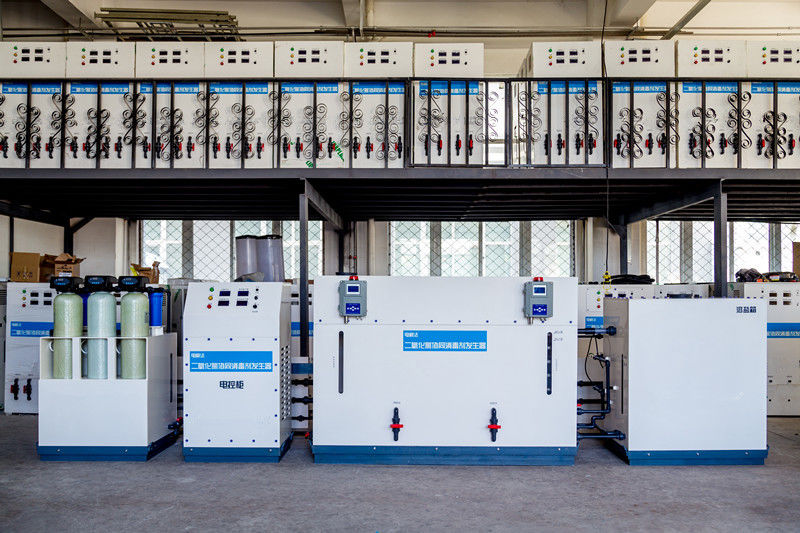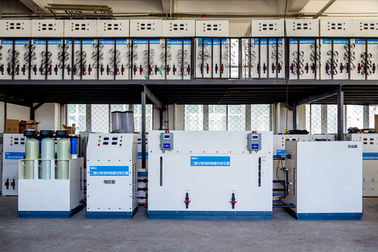Product Description
4000 g / h Chlorine Dioxide Generator Produce Mixed Oxide for Disinfection
Introduction
Chlorine dioxide (ClO2) is a strong oxidant widely applied for sterilization, disinfection, and waste-water treatment. It is commonly used on drinking water and environmental disinfection. It was also recommended as a commercial sanitizer to replace electrolyzed oxidizing water, chlorine (Cl2), hypochlorous acid (HOCl), and hypochlorite (OCl−). Contact of chlorine dioxide with organic substances in food or water results in microbial resistance and inactivation, but it also produces four trihalomethane (THM) byproducts, that is, chloroform, bromodichloromethane, dibromochloromethane, and bromoform, which are associated with toxicity and carcinogenesis. In Taiwan, tilapia fillets are an important economic product, and it is common practice to use sodium hypochlorite (NaClO) as a disinfecting agent for processing tilapia fillets; however, treatment of this type could lead to serious problems involving residual THMs in treated seafood. As for its application for vegetable and fruit disinfection, ClO2 gas has been successfully used to disinfect strawberries, lettuce, cabbage, and cucumbers with continuous methods. In this work, the bactericidal efficacy of ClO2 was evaluated for cleaning tilapia fillets with different cleaning methods.
Reaction Principle
Saturated salt water electrolysis in the electrolysis tank that with special electrolysis diaphragm, generated the strong oxidizing disinfection gases such as ClO2, Cl2, O3, H2O2, by water-jet machine negative pressure extraction, mixed with water safety to be treated to achieve the purpose of disinfection process.


Chlorine Dioxide Applications
Chlorine dioxide has a variety of commercial uses.
Treatment of Potable Water.
Chlorine dioxide has long been used to remove tastes and odors in potable water. It is also used in the disinfection of water, particularly where trihalomethanes are of concern. And it oxidizes soluble manganese and iron compounds, eliminating a major cause of stained sinks and fixtures.
Bacterial Control in Oil Wells and Petroleum Systems.
A patented use for chlorine dioxide is to treat water that is or will be contaminated with petroleum oil. Many such mixtures contain sulfite reducing bacteria that form undesirable sulfide compounds. Chlorine dioxide oxidizes these sulfides to sulfates, while preventing or substantially retarding the formation of colloidal sulfur.
Food Processing.
Chlorine Dioxide is highly effective for microbiological control in organically contaminated flume waters. Control of microbiological growths is necessary to insure food product safety and quality. Chlorine Dioxide has also found application in cherry bleaching.
Algae Control in Cooling Towers.
Chlorine dioxide efficiently and economically controls microbiological growths in industrial cooling waters under conditions unfavorable to chlorine. It is the primary microbiological control agent in systems with high pH, ammonia-nitrogen contamination, or persistent slime problems.
Treatment of Wastes.
Chlorine dioxide is used to disinfect sewage and plant wastes. It destroys phenolic, simple cyanides and sulfides by oxidation.
Specification
| Model |
Maximum yield of available chlorine |
Salt consumption |
Power |
Voltage |
Outer pipe diameter |
| ( g / h) |
( g / g Cl2) |
(Kw) |
(AC V) |
water intake |
Disinfectant outlet |
Sewage outlet |
| GBD-1000-ClO2 |
1000 |
1.6 |
<8 |
380 |
DN40 |
DN50 |
DN25 |
| GBD-1500-ClO2 |
1500 |
1.6 |
<12 |
380 |
DN40 |
DN50 |
DN25 |
| GBD-2000-ClO2 |
2000 |
1.6 |
<16 |
380 |
DN40 |
DN50 |
DN25 |
| GBD-3000-ClO2 |
3000 |
1.6 |
<24 |
380 |
DN40 |
DN50 |
DN32 |
| GBD-4000-ClO2 |
4000 |
1.6 |
<32 |
380 |
DN40 |
DN50 |
DN32 |
| GBD-5000-ClO2 |
5000 |
1.6 |
<40 |
380 |
DN40 |
DN50 |
DN32 |

 Your message must be between 20-3,000 characters!
Your message must be between 20-3,000 characters! Please check your E-mail!
Please check your E-mail!  Your message must be between 20-3,000 characters!
Your message must be between 20-3,000 characters! Please check your E-mail!
Please check your E-mail! 


